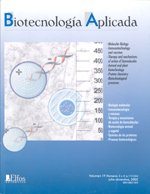
|
Biotecnologia Aplicada
Elfos Scientiae
ISSN: 0684-4551
Vol. 14, Num. 1, 1997, pp. 46
|
Biotecnologia Aplicada 1997 Volume 14 No. 1, pp.46
MULTISPECIFIC ANTI-IDIOTYPE MONOCLONAL ANTIBODIES AS IMMUNOREGULATORS
Amparo Macias,^1 Heidi Portuondo,^1 Roberto Bolanos,^1 Teresita
Rodriguez,^1 Consuelo Macias,^2 Rolando Perez^1 and Agustin Lage^1
^1 Center of Molecular Immunology, P.O. Box 16040 Havana, Cuba.
E- mail:amparo@ict.sld.cu
^2 National Center of Hematology and Immunology, Havana, Cuba.
Code Number:BA97010
Size of Files:
Text: 4K
Graphics: No associated graphics files
Introduction
In the last decades the paradigm of the Immune Network has evolved, stating
that the Immune System behaves as a whole, and part of its regulation is
based on the idiotypic interaction between the different lymphocytes clones
(1). This view opens a new approach for the treatment of some of the so
named "immune diseases" such as some autoimmune syndromes, or cancer. The
manipulation of the idiotypical interaction has shown to be of real value,
as suggested by the success reported for the treatment of various
autoimmune diseases with a human IgG pool (2), containing an important
fraction of antibodies capables of recognizing other antibodies or some
autoantigens (idiotipically connected natural autoantibodies).
We have obtained highly connected anti-idiotypic MAbs by immunizing mice
with anti-ganglioside IgM MAbs. Here we describe the preliminary
characterization of one of such antibodies.
Results and Discussion
The anti-idiotypic MAbB7 belongs to the IgG2a subclass, and was generated
in a singeneic model by immunizing Balb/c mice with an anti-GM2 specific
IgM antibody. The MAbB7 was classified as an "alfa" anti-idiotype, it did
not block the binding of the Ab1 antibody with the ganglioside GM2(NeuAc),
however, when coupled to KLH and injected in Balb/c mice induced an
antigen-independent serological antibody response (Ab1') against GM2(NeuAc)
but also to other gangliosides, suggesting the activation of ganglioside
multi-specific natural autoantibodies.
The MAbB7 showed other striking properties, such as heterogeneous binding
to different murine IgG monoclonal antibodies, to high idiotypically
connected neonatal murine IgM MAbs, and to different F(ab) 2 fragments from
human mieloma proteins. By fluorometric cytometry analysis (FACS), we also
showed that MAbB7 bound to normal human lymphocytes and to different human
B tumor cell lines. All these results suggested us that the MAbB7 is a
multispecific anti-idiotypic antibody, that binds to the variable regions
of murine and human immunoglobulins. We also demonstrated that the anti-
idiotypic MAbB7 produced some in vitro effects reported for the
human immunoglobulin pool, like depletion of bone marrow cells in short
term cultures, and inhibition of the mitogenic responses to PHA, Con A and
PMW by peripheral blood cells from healthy donors (3).
All these immunochemical and in vitro data suggest us to assess the
possible use of the multi-specific anti-idiotypic MAbB7 as an
immunoglobulin pool surrogate. It will be of major importance to determine
the effect that this antibody could have in the evolution of autoimmune
syndromes in some experimental models.
References
1. Varela JF, Coutinho A. Second generation immune networks. Immunology
Today 1991; 12(5): 159.
2. Dietrich G, Kaveri SV, Kazatchkine MD. Modulation of auto-immunity by
intravenous imunoglobulins (IVIg) through interaction with the immune
idiotypic network. Clin Immunol Immunopathol 1992;62:73.
3. Sunbdlad A, Marcos MAR, Malanchere E, Castro A, Haury M, Huetz F et
al. Observations of the mode of action of normal immunoglobulin at high
dose. Immunological Reviews 1994;139:125.
Copyright 1997 Elfos Scientiae
| 